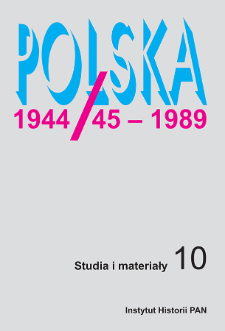- Wyszukaj w całym Repozytorium
- Piśmiennictwo i mapy
- Archeologia
- Baza Młynów
- Nauki przyrodnicze
Wyszukiwanie zaawansowane
Wyszukiwanie zaawansowane
Wyszukiwanie zaawansowane
Wyszukiwanie zaawansowane
Wyszukiwanie zaawansowane

Obiekt
Tytuł: Dokwaterowanie jako temat listów do władz w latach 1945–1956 : komunikat z badań
Inny tytuł:
Polska 1944/45-1989 : studia i materiały 10 (2011)
Współtwórca:
Instytut Historii Polskiej Akademii Nauk
Wydawca:
Miejsce wydania:
Opis:
Typ obiektu:
Abstrakt:
The present article is an attempt to outline briefly the “defensive strategies” of the citizens of communist Poland against compulsory assigning of new tenants to their dwellings, presented in the light of the source materials found in the Central Archives of Modern Records in Warsaw. The set of documents contain also the letters about housing matters, addressed, among others, to the Office of the Council of Ministers and the Ministry of Public Administration. Their authors used various arguments, from the appeals to the state’s ideology to their own services on behalf of communist Poland. They were also taking full advantage of their professional position and social standing (this was extremely successful).Assigning new occupants to existing houses was one of the solutions with which the authorities responded to the housing problems within their housing policy. In 1944–1956 the possibility to assign new individuals or whole families to “underpopulated” homes was the subject of hope by some while the subject of concern by others. “Underpopulation” occurred when the living space in square metres per a tenant was bigger than the norm set by the central and local authorities. For example: a family of three persons was allowed to occupy two rooms; a single person, regardless of their professional occupation, could have only one room.As a result of such restrictive regulations issued by the authorities of the Polish People’s Republic, the most aggrieved social group in the struggle for self-contained home became those whom the Republic was supposed to serve – the workers.
Czasopismo/Seria/cykl:
Polska 1944/45-1989 : studia i materiały
Tom:
Strona pocz.:
Strona końc.:
Szczegółowy typ zasobu:
Format:
Identyfikator zasobu:
oai:rcin.org.pl:59706 ; 2450-8357
Źródło:
IH PAN, sygn. B.155/10 Podr. ; IH PAN, sygn. B.156/10 ; kliknij tutaj, żeby przejść
Język:
Język streszczenia:
Prawa:
Licencja Creative Commons Uznanie autorstwa-Bez utworów zależnych 4.0
Zasady wykorzystania:
Zasób chroniony prawem autorskim. [CC BY-ND 4.0 Międzynarodowe] Korzystanie dozwolone zgodnie z licencją Creative Commons Uznanie autorstwa-Bez utworów zależnych 4.0, której pełne postanowienia dostępne są pod adresem: ; -
Digitalizacja:
Instytut Historii Polskiej Akademii Nauk
Lokalizacja oryginału:
Biblioteka Instytutu Historii PAN
Dostęp:
Kolekcje, do których przypisany jest obiekt:
- Repozytorium Cyfrowe Instytutów Naukowych > Kolekcje Partnerów > Instytut Historii PAN > Czasopisma
- Repozytorium Cyfrowe Instytutów Naukowych > Kolekcje Partnerów > Instytut Historii PAN > Wydawnictwa Instytutu
- Repozytorium Cyfrowe Instytutów Naukowych > Kolekcje Partnerów > Instytut Historii PAN > Wydawnictwa Instytutu > Czasopisma
- Repozytorium Cyfrowe Instytutów Naukowych > Kolekcje Partnerów > Instytut Historii PAN > Wydawnictwa Instytutu > Czasopisma > Polska 1944/45-1989
- Repozytorium Cyfrowe Instytutów Naukowych > Piśmiennictwo > Czasopisma/Artykuły
Data ostatniej modyfikacji:
16 gru 2020
Data dodania obiektu:
21 wrz 2016
Liczba pobrań / odtworzeń:
442
Wszystkie dostępne wersje tego obiektu:
https://rcin.org.pl./publication/78854
Wyświetl opis w formacie RDF:
Wyświetl opis w formacie RDFa:
Wyświetl opis w formacie OAI-PMH:
| Nazwa wydania | Data |
|---|---|
| Piwońska, Iwona, Dokwaterowanie jako temat listów do władz w latach 1945–1956 : komunikat z badań | 16 gru 2020 |
Obiekty Podobne
Piwońska, Iwona
Śmiechowski, Kamil (1985– )
Jarmuż, Michał
Jarmuż, Michał
Zandberg, Adrian
Materski, Wojciech (1944– )
Janowski, Maciej (1963– )

 INSTYTUT ARCHEOLOGII I ETNOLOGII POLSKIEJ AKADEMII NAUK
INSTYTUT ARCHEOLOGII I ETNOLOGII POLSKIEJ AKADEMII NAUK
 INSTYTUT BADAŃ LITERACKICH POLSKIEJ AKADEMII NAUK
INSTYTUT BADAŃ LITERACKICH POLSKIEJ AKADEMII NAUK
 INSTYTUT BADAWCZY LEŚNICTWA
INSTYTUT BADAWCZY LEŚNICTWA
 INSTYTUT BIOLOGII DOŚWIADCZALNEJ IM. MARCELEGO NENCKIEGO POLSKIEJ AKADEMII NAUK
INSTYTUT BIOLOGII DOŚWIADCZALNEJ IM. MARCELEGO NENCKIEGO POLSKIEJ AKADEMII NAUK
 INSTYTUT BIOLOGII SSAKÓW POLSKIEJ AKADEMII NAUK
INSTYTUT BIOLOGII SSAKÓW POLSKIEJ AKADEMII NAUK
 INSTYTUT CHEMII FIZYCZNEJ PAN
INSTYTUT CHEMII FIZYCZNEJ PAN
 INSTYTUT CHEMII ORGANICZNEJ PAN
INSTYTUT CHEMII ORGANICZNEJ PAN
 INSTYTUT FILOZOFII I SOCJOLOGII PAN
INSTYTUT FILOZOFII I SOCJOLOGII PAN
 INSTYTUT GEOGRAFII I PRZESTRZENNEGO ZAGOSPODAROWANIA PAN
INSTYTUT GEOGRAFII I PRZESTRZENNEGO ZAGOSPODAROWANIA PAN
 INSTYTUT HISTORII im. TADEUSZA MANTEUFFLA POLSKIEJ AKADEMII NAUK
INSTYTUT HISTORII im. TADEUSZA MANTEUFFLA POLSKIEJ AKADEMII NAUK
 INSTYTUT JĘZYKA POLSKIEGO POLSKIEJ AKADEMII NAUK
INSTYTUT JĘZYKA POLSKIEGO POLSKIEJ AKADEMII NAUK
 INSTYTUT MATEMATYCZNY PAN
INSTYTUT MATEMATYCZNY PAN
 INSTYTUT MEDYCYNY DOŚWIADCZALNEJ I KLINICZNEJ IM.MIROSŁAWA MOSSAKOWSKIEGO POLSKIEJ AKADEMII NAUK
INSTYTUT MEDYCYNY DOŚWIADCZALNEJ I KLINICZNEJ IM.MIROSŁAWA MOSSAKOWSKIEGO POLSKIEJ AKADEMII NAUK
 INSTYTUT PODSTAWOWYCH PROBLEMÓW TECHNIKI PAN
INSTYTUT PODSTAWOWYCH PROBLEMÓW TECHNIKI PAN
 INSTYTUT SLAWISTYKI PAN
INSTYTUT SLAWISTYKI PAN
 SIEĆ BADAWCZA ŁUKASIEWICZ - INSTYTUT TECHNOLOGII MATERIAŁÓW ELEKTRONICZNYCH
SIEĆ BADAWCZA ŁUKASIEWICZ - INSTYTUT TECHNOLOGII MATERIAŁÓW ELEKTRONICZNYCH
 MUZEUM I INSTYTUT ZOOLOGII POLSKIEJ AKADEMII NAUK
MUZEUM I INSTYTUT ZOOLOGII POLSKIEJ AKADEMII NAUK
 INSTYTUT BADAŃ SYSTEMOWYCH PAN
INSTYTUT BADAŃ SYSTEMOWYCH PAN
 INSTYTUT BOTANIKI IM. WŁADYSŁAWA SZAFERA POLSKIEJ AKADEMII NAUK
INSTYTUT BOTANIKI IM. WŁADYSŁAWA SZAFERA POLSKIEJ AKADEMII NAUK


































